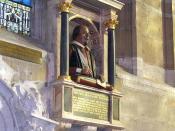Tragedy, particularly in the works of William Shakespeare, reveals to the audience the bitter realities of human flaws and error. The essence of Shakespeare's tragedies is the expression of one of the greatest paradoxes of life-disappointment. Just as TS Eliot explores human error and eventual disappointment in his poem "The Love Song of J. Alfred Prufrock", Shakespeare does the same in plays such as "Hamlet", "Othello" and "Macbeth", all of which address the notion of tragedy and conclude with disappointment.
The protagonist is central to Shakespearean tragedies, and it is their death which shapes the play. A common characteristic often shared amongst the likes of King Lear, Othello and Hamlet is the way in which they are portrayed as normal men, creating a bridge between the character and the audience. In Macbeth for example, we find ourselves let in on the plot to murder King Duncan, see the influence of Lady Macbeth, and we hear the prophecies that motivate Macbeth.
Such characterisation of the central figures is well suited to expressing tragedy. We are led to identify ourselves with the protagonist and feel a sense of attachment to them.
Death of the protagonist at the end of the play is very symbolic, and is present in all of Shakespeare's tragedies. Death is the essence of disappointment, in the words of David Chandler, "it is the embodiment of defeat". The symbolic character of death is especially notable in Othello's suicide. Iago's treachery caused several other deaths but not Othello's. Othello's suicide is a response to his despair. The tragedy in Hamlet is not specifically Hamlet's death, but the overall miscalculation and unnecessary bloodshed. Hamlets own death merely confirms the disaster. The convention of unnecessary death and bloodshed followed by the demise of the protagonist doubles the tragic impact,


